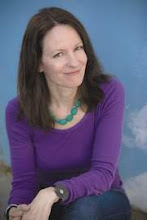
The December issue of my Warren Wilson MFA alumni newsletter was chock full of great stuff...but I just had to share this profile of novelist
Vyvyane Loh, author of
Breaking the Tongue. Doctor, choreographer, animal rescuer and writer-- Vyvyane's secret to writing novels is
carving out 42 minutes for writing every day. Read this interview ( a great conversation between two writers conducted by fellow WW MFAer
Cindy Phoel), and it will be hard to complain about not having enough time to write. Really--it's encouraging.
Guggenheim Fellow & Wally fiction writer Vyvyane Loh talks about her 42 minutes of daily writing and her 12 pet bunnies. When the Boston Globe profiled Vyvyane Loh (Warren Wilson MFA fiction ’01) on the 2004 publication of her first novel, Breaking the Tongue, they spoke of her as a dedicated physician, accomplished choreographer, and critically acclaimed novelist. “She’s All That,” the piece was titled, and for those of us who know Vyvyane, this seemed like an apt title. Four years later, we find Vyvyane collecting a Guggenheim Fellowship while she puts the finishing touches on her second novel—proving that she’s all that, and then some. In a conversation with her Wally friend and classmate Cindy Phoel (Warren Wilson MFA fiction ’03), Vyvyane talks about her 42-minute-a-day writing habit and her secret desire to be—of all things—a poet!
Cindy: A few months ago, we were talking about whether—and how much—we were writing. I was failing to get enough writing done, and you told me I was setting my goals too high. You shared with me your own strategy, which mirrors the strategy you use with your patients who are trying to lose weight. It’s a strategy I think every writer strapped for time (certainly all moms!) should know.
Vyvyane: I try to set laughable goals. 20 minutes of writing per day, or 40 minutes if it’s an easy day. I tell my patients who are trying to lose weight to walk for NO MORE THAN 5 minutes for the first week of their weight loss program, and they always come back saying they felt so silly only exercising for 5 minutes that they walked for 10 minutes, or 20, or even 30 minutes. The extra time is fine, but you get points for doing the minimum, which is how I try to set up my writing time as well. I write for 42 minutes each morning—the extra 2 minutes makes me feel very virtuous. I use a timer and there are lots of days when I have one eye fixed on the seconds ticking away and one eye on the screen, and when the timer goes off—relief! I’m done! Yippee yay!
Can you honestly say that your second novel—which is quite long, perhaps 500 pages—was written on 20 or 42 minutes a day? Or were there periods where you were writing more than that?
I did write lots in spurts—50 pages over 3 days, 25 pages over a couple of days, but most of it was written in my 42 minutes per day!
I am reminded of the spin class you used to teach—a hard-driving hour of cycling at 8:00 on Saturday mornings. One day, I found myself sitting in front of these two burley guys, who obviously thought this would be a walk in the park. They chit-chatted their way through the warm up and into the first song, and then after a bit of panting, I heard, “She’s kicking my ass!”
Yeah, I figured we should work as hard as possible for the hour and then forget about it for the rest of the day. It’s not too different with writing. There’s so little time to write, so I try to go full steam ahead for the 42 minutes and then not agonize over not doing more for the rest of the day. Remember our motto of keeping the small picture in view and forgetting the big picture. I think you told me that one time, and I keep reminding myself now when I feel overwhelmed: just stay with the small picture.
It’s a bit paradoxical, isn’t it, that you say you focus on the small picture, and yet your work is decidedly big picture. Your first novel was set during the Japanese invasion of Singapore during WWII. And this second novel tackles suffering in Rwanda, Haiti, and Afghanistan. Time and place and how your story reflects or interprets the world are very important to you. Can you talk about this?
Yes, I suppose I do keep the big picture in mind when I write. I am always conscious of how various events in my book are seen through the lens of what is happening in the world. I have never forgotten what I learned when I was a Classics student in college: that when Agamemnon left Greece to fight in the Trojan War, he chose—not a general, not a politician—a poet to rule in his place, because he felt that the poet was the moral conscience of the people and that this conscience would steer his kingdom on the right path. That really stuck with me, and it’s always at the back of my mind when I’m writing.
Let’s talk for a moment about starting places. We’re often encouraged to start with character or place—even an image that ignites us. For you, though, the impetus is theme. Can you talk about this?
You’re right that I don’t start with character or plot. I tend to start with ideas and yes, I suppose, theme. I spend a lot of time reading non-fiction on things or ideas that fascinate me and sometimes they captivate me so much that I want to write a book about them. And often, it’s because there’s something that I’m struggling with—a concept or an idea that I want to embrace but can’t for whatever reason—that I end up writing about it.
It feels a bit narrow to categorize you as a fiction writer. With Breaking the Tongue, you were certainly a historian. And with your new novel, you have taken on the role of translator—a role I think you’ve particularly enjoyed.
I’ve been interested in literary translation ever since I took a translation seminar with Rosanna Warren in college and read George Steiner’s After Babel. I still go back to that book every year, believe it or not. I taught myself Portuguese because I wanted to translate Drummond and Pessoa and Machado de Assis. My current book deals with translating a poem by Paul Celan. I wrote poetry when I was in college. I only started writing fiction about a year and a half before Warren Wilson. I was tempted to apply in Poetry but chickened out. There are lots of things I would love to get round to writing if I had the time (or if Oprah would give me a break): poetry, more translations, plays.
One last question: You have no fewer than twelve bunnies in your house. These are animals that you’ve fostered or adopted when they needed homes. Is this yet another example of everything-Vyvyane-does-she-does-with-intensity, or is this your moral conscience at work? Or is this, perhaps, your human attraction to things soft and fuzzy?
I have 12 bunnies, 1 dog and 1 parakeet, 1 hus-bun. Cleaning up after them takes 2 hours of my day! (Well, I’ve sort of trained the hus-bun to fend for himself). I’m a big animal advocate. I think it’s part moral conscience—I hate the way we’ve messed up Nature and blame her for everything. I mean, you’ve heard of people who move to the wilderness and then complain about those damn bears in their garbage all the time and then plot to shoot them to make the place “safer.” The bunnies I’ve adopted were mostly Easter dumps. They have wonderful personalities and one of them, Oolong, is my personal paper shredder. I show her stuff that I’ve written that I’m not too hot about and she chomps on it and poops it out later. Her way of saying, “This stuff is s**t.” Literally.








































